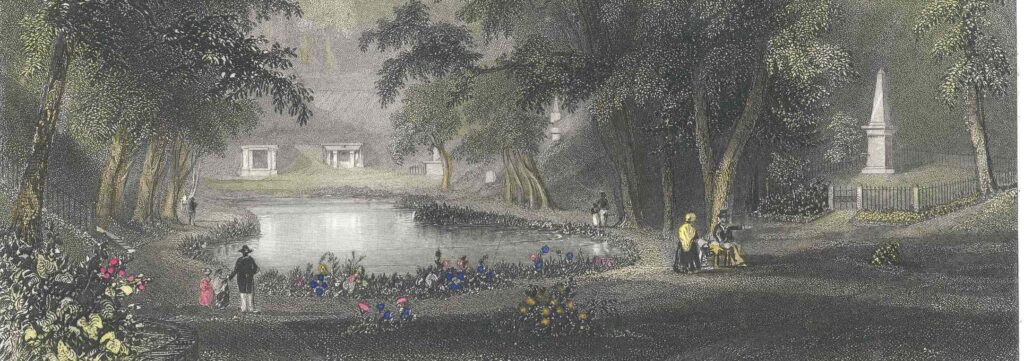Historical Collections Overview
Search Our Collections
We invite you to explore our online collections. Search for digitized images and catalogue information.

Collections Description
More than 3,500 linear feet of records, photographs, books, and objects document Mount Auburn’s role as an active cemetery, significant cultural institution, and National Historic Landmark. The collections reveal society’s changing ideas about death, cremation, burial and commemoration; religion and ethics; horticulture and landscape design; and historic preservation and nature conservation over the past 188 years.
The Objectives of the Historical Collections Department are to:
- Collect materials in accordance with the Cemetery’s Collecting Policy in order to gather an accurate, authentic, and complete record of Mount Auburn’s history.
- Preserve the holdings of the Historical Collections by maintaining optimal environmental conditions for storage and exhibition; ensuring proper handling and treatment; overseeing maintenance and long-term collections care; and ensuring disaster preparedness.
- Provide access to the Historical Collections through standardized professional procedures and best practices, finding aids, and research services.
- Increase knowledge of Mount Auburn Cemetery through documentation, cataloguing, staff training, public programs, and by supporting research by staff and the public.
- Promote the highest standards of care and management to ensure a trusted repository for safeguarding of the records and objects of Mount Auburn Cemetery.
Collecting Policy
Mount Auburn’s Collecting Policy provides general guidelines relating to gifts and acquisitions to the Historical Collections & Archives. The Mount Auburn Cemetery Historical Collections Department collects:
- Institutional records generated by Mount Auburn Cemetery from its founding in 1831 to the present, including administrative and operational records, financial and legal records, interment and cremation records, horticulture and preservation records, as well as reports, books, correspondence, and associated papers by Cemetery staff in all departments. Examples include founding documents, trustee meeting minutes, deeds, burial permits, correspondence between the Cemetery and families, work orders, and invoices.
- Objects created and/or used by Cemetery staff for their intended purposes. Examples include blacksmith tools, surveying and drafting equipment, printing plates, tomb keys, and gatekeeper’s helmets.
- Maps and plans pertaining to the buildings, monuments, lots, infrastructure, trees, plants, and land of Mount Auburn Cemetery from its founding to the present. Examples include lot planting plans, individual monument designs and blueprints, nineteenth-century Cemetery surveys, and visitor maps.
- Photographs in all formats that document Mount Auburn from its founding to the present. Examples include views of the Cemetery’s landscape, monuments, buildings, horticulture, site development, programs, and visitors.
- Fine and decorative art about Mount Auburn from its founding to the present. Examples include paintings, drawings, prints, sculpture, and ornamental objects.
- Ephemera created about Mount Auburn. Examples include souvenir tea cups, postcards, and decorative pins.
- Books, publications, and unpublished papers about Mount Auburn Cemetery including non-fiction, fiction, poetry, and scholarly papers. Examples include nineteenth-century guidebooks of Mount Auburn, signed copies and first editions of books written by and about individuals buried at the Cemetery; histories of the Cemetery, biographies of Mount Auburn founders, and remarks given at Cemetery programs and events. Other publications include those relating to the rural cemetery movement, death and burial practices, memorial art and design, horticulture and landscape design, other cemeteries, cemetery design and preservation, and local history.
- Biographical records that provide historical context about individuals interred, cremated, and commemorated at Mount Auburn. Examples include obituaries, memorial service programs, and portraits.
For further information about supporting and donating to the Collections, please contact the Curator of Historical Collections at curator@mountauburn.org.
